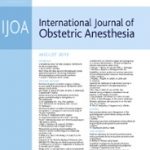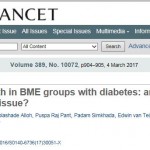 Congratulations on the Faculty of Health & Social Sciences team which had its paper ‘Vital signs and other observations used to detect deterioration in pregnant women: an analysis of vital sign charts in consultant-led UK maternity units’ accepted by the International Journal of Obstetric Anesthesia (published by Elsevier).
Congratulations on the Faculty of Health & Social Sciences team which had its paper ‘Vital signs and other observations used to detect deterioration in pregnant women: an analysis of vital sign charts in consultant-led UK maternity units’ accepted by the International Journal of Obstetric Anesthesia (published by Elsevier).
The paper compares: (i) vital sign values used to define physiological normality; (ii) symptoms and signs used to escalate care; (iii) 24 type of chart used; and (iv) presence of explicit instructions for escalating care. The authors conclude that the wide range of ‘normal’ vital sign values in different systems used in the UK and the Channel Islands suggests a lack of equity in the processes for detecting deterioration and escalating care in hospitalised pregnant and postnatal women. Agreement regarding ‘normal’ vital sign ranges is urgently required and would assist the development of a standardised obstetric early warning system and chart. The lead author of this new paper is FHSS Visiting Professor Gary Smith, his co-authors include FHSS staff Vanora Hundley, Lisa Gale_Andrews and Edwin van Teijlingen as well as three BU Visiting Faculty: Debra Bick (King’s College London), Mike Wee (Poole Hospital NHS Foundation Trust) and Richard Isaacs (University Hospital Southampton).
 New collaborative paper BU-NHS colleagues
New collaborative paper BU-NHS colleagues One week: five FHSS publications
One week: five FHSS publications First BU paper accepted for 2021
First BU paper accepted for 2021










 No access to BRIAN 5-6th February
No access to BRIAN 5-6th February Missing Persons Indicator Project Recruitment
Missing Persons Indicator Project Recruitment Celebrating our Research: Postgraduate Research Showcase 2026
Celebrating our Research: Postgraduate Research Showcase 2026 Nursing Research REF Impact in Nepal
Nursing Research REF Impact in Nepal Fourth INRC Symposium: From Clinical Applications to Neuro-Inspired Computation
Fourth INRC Symposium: From Clinical Applications to Neuro-Inspired Computation ESRC Festival of Social Science 2025 – Reflecting back and looking ahead to 2026
ESRC Festival of Social Science 2025 – Reflecting back and looking ahead to 2026 ECR Funding Open Call: Research Culture & Community Grant – Apply now
ECR Funding Open Call: Research Culture & Community Grant – Apply now MSCA Postdoctoral Fellowships 2025 Call
MSCA Postdoctoral Fellowships 2025 Call ERC Advanced Grant 2025 Webinar
ERC Advanced Grant 2025 Webinar Update on UKRO services
Update on UKRO services European research project exploring use of ‘virtual twins’ to better manage metabolic associated fatty liver disease
European research project exploring use of ‘virtual twins’ to better manage metabolic associated fatty liver disease